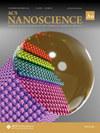Label-Free Digital Holotomography Reveals Ibuprofen-Induced Morphological Changes to Red Blood Cells
IF 4.8
Q2 NANOSCIENCE & NANOTECHNOLOGY
引用次数: 2
Abstract
Understanding the dose-dependent effect of over-the-counter drugs on red blood cells (RBCs) is crucial for hematology and digital pathology. Yet, it is challenging to continuously record the real-time, drug-induced nanoscopic shape changes of RBCs in a label-free manner. Here, we demonstrate digital holotomography (DHTM) enabled real-time, label-free concentration-dependent and time-dependent monitoring of ibuprofen on RBCs from a healthy donor. The RBCs are segmented based on 3D and 4D refractive index tomograms and their morphological and chemical parameters are retrieved with their shapes classified using machine learning. We directly observed the formation and motion of spicules on the RBC membranes when aqueous solutions of ibuprofen were drop cast on wet blood, creating rough-membraned echinocyte forms. At low concentrations of 0.25-0.50 mM, the ibuprofen-induced morphological change was transient but at high concentrations (1.5-3 mM) the spiculated RBC remained over a period of up to 1.5 hours. Molecular simulations confirmed that aggregates of ibuprofen molecules at high concentrations significantly disrupted the RBC membrane structural integrity and lipid order, but produced negligible effect at low ibuprofen concentrations. Control experiments on the effect of urea, hydrogen peroxide and aqueous solutions on RBCs showed zero spicule formation. Our work elucidates the dose-dependent chemical effects on RBCs using label-free microscopes that can be deployed for the rapid detection of overdosage of over-the-counter and prescribed drugs. Significance The interaction between drugs and blood cells is an important field of study in order to understand the risk for drug-induced haematological adverse effects. Using digital holo-tomographic microscopy (DHTM), we can resolve the real-time effect of medications on the morphological and chemical properties of red blood cells with high spatial and temporal resolution and in a label-free manner. We show that our approach can be used as a haematology platform for the diagnosis of blood disorders and for monitoring the dose-dependent effect of prescribed and over-the-counter medications in a cost-effective manner, with significant implications for its applicability in resource-limited settings and in the field of personalized medicine.无标签数字全息断层扫描揭示布洛芬诱导红细胞形态学改变
了解非处方药对红细胞(RBCs)的剂量依赖性作用对血液学和数字病理学至关重要。然而,以无标记的方式连续记录RBCs的实时、药物诱导的纳米级形状变化是一项挑战。在这里,我们展示了数字全息断层扫描(DHTM)能够实时、无标记、浓度依赖性和时间依赖性地监测布洛芬对健康供体红细胞的影响。基于3D和4D折射率断层图像对RBC进行分割,并利用机器学习对其形状进行分类来检索其形态和化学参数。当布洛芬水溶液滴注在湿血上时,我们直接观察到红细胞膜上针状物的形成和运动,产生粗糙的膜棘细胞形式。在0.25-0.50mM的低浓度下,布洛芬诱导的形态变化是短暂的,但在高浓度(1.5-3mM)下,加香料的RBC保持长达1.5小时。分子模拟证实,高浓度的布洛芬分子聚集体显著破坏了红细胞膜的结构完整性和脂质秩序,但在低浓度的布洛芬下产生的影响可以忽略不计。尿素、过氧化氢和水溶液对RBCs影响的对照实验显示,无毛刺形成。我们的工作使用无标记显微镜阐明了RBCs的剂量依赖性化学效应,该显微镜可用于快速检测非处方药和处方药的过量使用。意义药物和血细胞之间的相互作用是一个重要的研究领域,以了解药物引起的血液学不良反应的风险。使用数字全息断层显微镜(DHTM),我们可以以高空间和时间分辨率,以无标记的方式,实时解决药物对红细胞形态和化学性质的影响。我们表明,我们的方法可以作为血液学平台,以成本效益高的方式诊断血液疾病,并监测处方药和非处方药的剂量依赖性效果,这对其在资源有限的环境和个性化医学领域的适用性具有重要意义。
本文章由计算机程序翻译,如有差异,请以英文原文为准。
求助全文
约1分钟内获得全文
求助全文
来源期刊

ACS Nanoscience Au
材料科学、纳米科学-
CiteScore
4.20
自引率
0.00%
发文量
0
期刊介绍:
ACS Nanoscience Au is an open access journal that publishes original fundamental and applied research on nanoscience and nanotechnology research at the interfaces of chemistry biology medicine materials science physics and engineering.The journal publishes short letters comprehensive articles reviews and perspectives on all aspects of nanoscience and nanotechnology:synthesis assembly characterization theory modeling and simulation of nanostructures nanomaterials and nanoscale devicesdesign fabrication and applications of organic inorganic polymer hybrid and biological nanostructuresexperimental and theoretical studies of nanoscale chemical physical and biological phenomenamethods and tools for nanoscience and nanotechnologyself- and directed-assemblyzero- one- and two-dimensional materialsnanostructures and nano-engineered devices with advanced performancenanobiotechnologynanomedicine and nanotoxicologyACS Nanoscience Au also publishes original experimental and theoretical research of an applied nature that integrates knowledge in the areas of materials engineering physics bioscience and chemistry into important applications of nanomaterials.
 求助内容:
求助内容: 应助结果提醒方式:
应助结果提醒方式:


